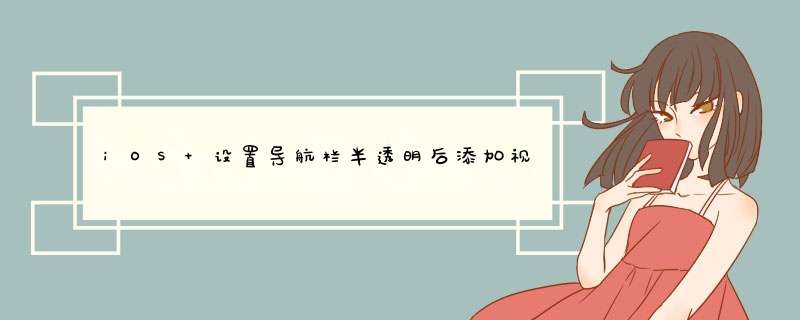
1.设置导航栏为不透明
2.设置导航栏为半透明 [系统默认就是半透明的]
注意:iOS 导航栏如果设置为半透明,则其透明度为90%.也就是说,如果设置 self.navigationController.navigationBar.barTintColor =[UIColor colorWithRed:1 green:0 blue:0 alpha:1],真正显示到界面上的颜色是有90%透明的
3.设置导航栏的背景颜色不会影响半透明 translucent 这个属性
4.隐藏导航栏
只要隐藏了导航栏后,不管 translucent 这个属性的值是ture或者false都会是下图效果
结果说明
如果设置了导航栏的 translucent = YES 这时在添加子视图的坐标原点相对屏幕坐标是(0,0).如果设置了 translucent = NO 这时添加子视图的坐标原点相对屏幕坐标就是(0, 64).
这里的xib是一个控制器所对应的view,使用导航控制器push到这个控制器的时候,得到以下两种情况.
1.导航栏半透明
2.导航栏不透明
UIImageView *imageView = [[UIImageView alloc] initWithImage:[UIImage imageNamed:@"bgImage"]]
创建并设置默认图, 也可以
UIImageView*imageView = [[UIImageView alloc] init]
imageView.image= [UIImageimageNamed:@"bgImage"]
还可以这样先设置imageview的大, 在设置图片
UIImageView*imageView = [[UIImageView alloc] initWithFrame:(CGRectMake(0,144,SCREEN_Width,50))]
imageView.image= [UIImageimageNamed:@"bgImage"]
由此可看imageview的frame可以这样设置
imageView.frame=CGRectMake(0,144,SCREEN_Width,50)
通常我们使用的的imageview都会添加圆角边框
imageView.layer.masksToBounds = YES
imageView.layer.cornerRadius=25
imageView.layer.borderColor = [UIColor blueColor].CGColor
imageView.layer.borderWidth=1
这个圆角和边框像view和label以及button的设置方式都是一样的 当然imageview也一样
imageView.backgroundColor= [UIColorclearColor]图片设置背景颜色, 我通常使用clearColor 透明
imageView.userInteractionEnabled = YES图片设置成可交互, 设置为NO则不能交互
[self.viewaddSubview: imageView]添加视图也可叫做显示视图
设置图片内容的布局方式 imageView.contentMode
这个属性是用来设置图片的显示方式,如居中、居右,是否缩放等
imageView.contentMode = UIViewContentModeScaleAspectFit
UIViewContentMode contentMode枚举类型
(1) UIViewContentModeScaleToFill 默认,对图片进行拉伸处理(不是按比例),是充满bouns
(2) UIViewContentModeScaleAspectFit 按原图比例进行拉伸,是图片完全展示在bouns中
(3) UIViewContentModeScaleAspectFill 按原图比例填充,使图片展示在bouns中,可能只显示部分
(4) UIViewContentModeRedraw 重划边界变化(重设 - setNeedsDisplay)
(5) UIViewContentModeCenter 图片显示在imageview的正中间,原图大小
(6) UIViewContentModeTop 图片显示在imageview的上部,原图大小
(7) UIViewContentModeBottom 图片显示在imageview的下部,原图大小
(8) UIViewContentModeLeft 图片显示在imageview的左部,原图大小
(9) UIViewContentModeRight 图片显示在imageview的右部,原图大小
(10) UIViewContentModeTopLeft 图片显示在imageview的左上部,原图大小
(11) UIViewContentModeTopRight 图片显示在imageview的右上部,原图大小
(12) UIViewContentModeBottomLeft 图片显示在imageview的左下部,原图大小
(13) UIViewContentModeBottomRight 图片显示在imageview的右下部,原图大小
imageView.alpha = 1.0 设置图片透明度
NSString *path1 = [[NSBundle mainBundle] pathForResource:@"1" ofType:@"jpg"]
NSString *path2 = [[NSBundle mainBundle] pathForResource:@"2" ofType:@"jpg"]
NSString *path3 = [[NSBundle mainBundle] pathForResource:@"3" ofType:@"jpg"]
imageView.animationImages = @[[UIImage imageWithContentsOfFile:path1],[UIImage imageWithContentsOfFile:path2],[UIImage imageWithContentsOfFile:path3]]
imageView.animationDuration = 5.0f 设置循环一次的时间
imageView.animationRepeatCount = 0 // 设置循环次数(0为无线循环)
[imageView startAnimating] // 开始动画
[imageView stopAnimating] // 停止动画
NSData *imageData = [NSData dataWithContentsOfFile:path]
UIImage *image4 = [UIImage imageWithData:imageData]
NSString *path = [[NSBundle mainBundle] pathForResource:@"1" ofType:@"jpg"]
UIImage *image2 = [UIImage imageWithContentsOfFile:path]
ImageView.hidden = NO 隐藏或者显示图片 YES为隐藏
[ImageView sizeToFit] 将图片尺寸调整为与内容图片相同
UITapGestureRecognizer *singleTap = [[UITapGestureRecognizer alloc] initWithTarget:self action:@selector(tapImageView:)] // 设置手势
[ImageView addGestureRecognizer:singleTap] // 给图片添加手势
在开发过程中,列表作为最常用的控件,有时候需要对类似详情页这种需要很多自定义且很少复用的页面用scrollView来实现这里我用xib来举例
1.先往xib中拖一个scrollView
设置当前scrollView上左下右与父视图约束为0;宽度任意设置一个固定值
2.再拖一个view到scrollview上,设置view与scrollView的上下左右约束为0,设置此view的宽度等于scrollView ,这时候系统会报约束错误
我们将scrollView上的这个子view的intrinsic size 修改成placeholder,并设置任意宽高,因为宽高是随着子控件的宽高自动布局的
tips:考虑到部分视图比较长,可以将当前控制器的view的size设置为freeform,这样可以更直观的查看显示效果
欢迎分享,转载请注明来源:内存溢出

 微信扫一扫
微信扫一扫
 支付宝扫一扫
支付宝扫一扫
评论列表(0条)